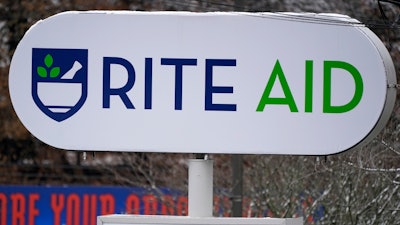
Rite Aid's plan to close more stores as part of its bankruptcy process could hurt access to medicine and care, particularly in some majority Black and Hispanic neighborhoods and in rural areas, experts say.
The drugstore chain said late Sunday that its voluntary Chapter 11 process will allow it to speed up its plan to close underperforming stores. The company runs more than 2,000 stores, mostly on the East and West coasts.
It said it doesn't know yet which ones will close, but The Wall Street Journal reported last month that the company has proposed closing 400 to 500 of them.
When drugstore chains shutter stores, they often target locations in lower-income, Black and Latino neighborhoods with people covered through government-funded insurance programs like Medicaid, said Dima Qato, a University of Southern California associate professor who studies pharmacy access.
"They tend to close in these neighborhoods regardless of whether or not there is another pharmacy nearby," Qato said.
Rite Aid also has a lot of stores in smaller, rural markets that don't get as much business as locations in big cities, noted Jeff Jonas, a portfolio manager for Gabelli Funds who follows drugstores. He expects the company to close several hundred stores over the next couple years.
Closings can create so-called "pharmacy deserts," or neighborhoods without easy access to a drugstore. That can be poor neighborhoods where residents are less likely to own cars and a drugstore is more than half a mile away. It also refers to rural areas where drugstores may be miles away.
"It'll kind of worsen the problem of pharmacy deserts and disparities in pharmacy access," Qato said.
She noted that patients who lose drugstore access are less likely to stay on their regular prescriptions, and that can affect their health.
Aside from filling prescriptions, many of these stores also have become growing sources for annual vaccines and health care in recent years.
The Philadelphia-based company said in a fact sheet laying out its plan that it "will make every effort to ensure our customers have access to health services, whether at another Rite Aid or another nearby pharmacy."
The company had started a pilot program that aimed to address rural pharmacy deserts by opening a couple smaller stores in rural Virginia. A Rite Aid representative declined to comment on whether that program will continue.
Jonas said drugstores do want to help with pharmacy access, but the economics still need to work for these companies.
"Medicaid definitely pays the least and isn't terribly attractive for them," he said.
___
Associated Press video journalist Ted Shaffrey contributed to this report.






















